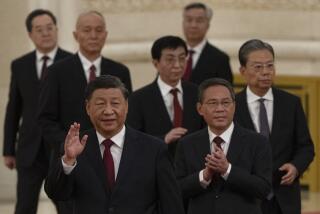Beijing Planning Market-Oriented Economic Reforms : China: Policy statement is worded to justify capitalistic methods. It also states adherence to political dictatorship.
- Share via
BEIJING — The Chinese Communist Party, in a major policy statement released Monday, said it will gradually free most prices and institute other market-oriented reforms but will not tolerate any transformation to capitalism or challenge to communist rule.
The document, approved last month at a closed meeting of the party’s Central Committee, broadly endorses the two basic policies of market-oriented economic reform and strict political dictatorship followed since 1979 under senior leader Deng Xiaoping.
It calls for this approach to China’s modernization to continue throughout the coming decade. In this way, it declares, China intends to nearly double its gross national product during the 1990s--after more than doubling it in the previous decade--and thereby achieve its goal of having in the year 2000 a GNP four times that of 1980.
The document, excerpts of which were carried by the official New China News Agency, is the clearest and most authoritative endorsement of economic reform to be issued since army troops were used in June, 1989, to crush pro-democracy protests in Beijing.
In the wake of that crackdown, some foreign and Chinese observers have feared that communist hard-liners would force a reversal of the reforms of the 1980s. For the last 19 months, different factions in the leadership have appeared to be stalemated. Economic reforms generally have neither moved significantly forward nor been reversed.
The plan released Monday prescribes limited and cautious steps toward further reform, but it avoids the rapid and sweeping measures favored by the most liberal wing of the Communist Party. It stresses that socialism itself will not be dismantled.
In laying down guiding principles both for China’s 1991-1995 economic “five-year plan” and for a more general economic program through the year 2000, the document places maintenance of “the people’s democratic dictatorship” and the “leadership of the Communist Party” at the top of the list.
But then, in a key formulation extremely useful to economic reformers, it states that China must “make the development of the social productive forces the fundamental task of socialism.”
This idea that economic development is the main purpose of socialism--a theme normally stressed during periods of accelerating reform--is vitally important in Chinese politics because it allows reformers within the Communist Party to justify capitalistic methods on the grounds that they help achieve socialism’s main goal.
The document states that China will move to a more market-oriented system rather than return to command-style central planning. “Mandatory plans will be reduced,” it declares. “Routine production and operations of enterprises . . . should be left to market regulation.”
However, central planning and guidelines will still be used for “control of aggregate supply and demand,” promotion of key sectors of the economy and “other major economic activities affecting the overall situation.”
Price reform “should proceed in an active and prudent way,” it says. “The government should control the prices of a few important commodities and labor services that concern the national economy and the people’s livelihood, leaving the rest to market regulation.”
China will also open wider to the outside world. It will “expand economic and technological exchanges and cooperation with other countries, actively and effectively utilize foreign funds, further implement the coastal economic development strategy (and) develop the export-oriented economy,” the plan states.
China intends to develop wholesale and futures grain markets, allow further growth of private enterprise and increase incentives by tying employees’ wages to the quality and quantity of their work, the plan says.
Experiments with stock markets and share-holding also will continue. The document rules out, however, any large-scale privatization of existing state-owned enterprises, a step that some Western and Chinese economists say is essential if China’s reforms are ultimately to succeed.
Instead of privatization, the plan envisions refinement of a system in which government-owned enterprises are given enough autonomy to function independently in a market environment.
More detailed versions of the 1991-1995 economic plan and the overall 1990s economic program are now being drafted, based on the principles of the Central Committee document, for approval this spring by the National People’s Congress, the New China News Agency reported. The congress, China’s parliament, routinely endorses decisions made by the Communist Party leadership.
More to Read
Sign up for Essential California
The most important California stories and recommendations in your inbox every morning.
You may occasionally receive promotional content from the Los Angeles Times.













